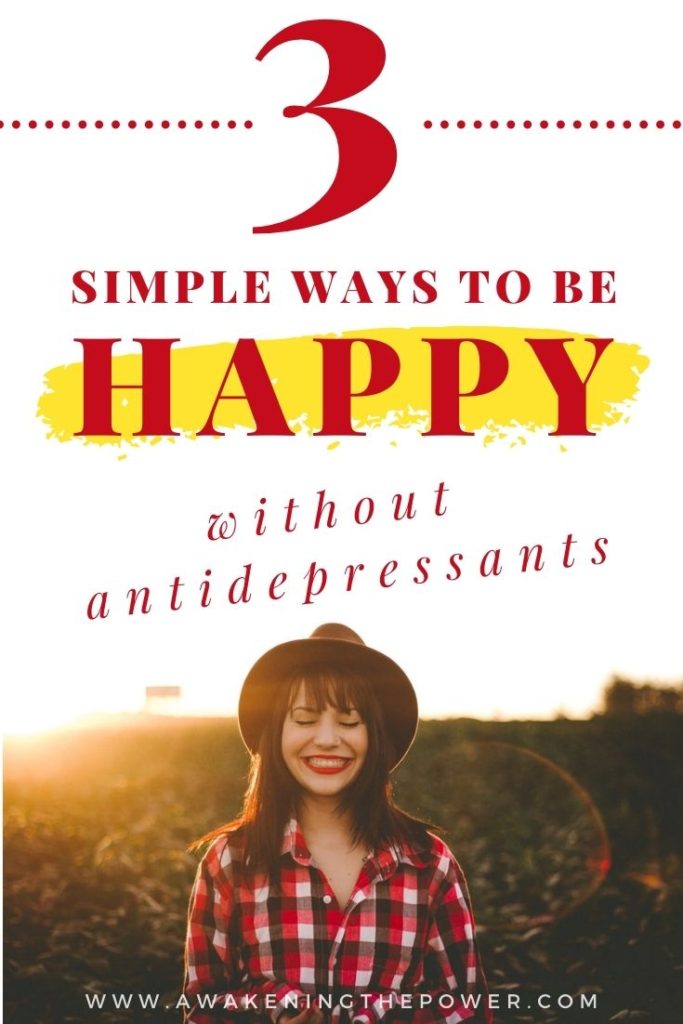According to the Greek philosopher Aristotle, “Happiness is the meaning and the purpose of life, the whole aim and end of human existence.” But if that’s true, why are so many of us feel sad, restless, and discontent? Why aren’t we happy?
Perhaps, the answer is in the definition of happiness.
What is Happiness?
My favorite definition of happiness is from Albert Einstein. It’s simple: “a table, a chair, a bowl of fruit and a violin.”
But for many of us modern humans living in the “hustle culture,” happiness is defined by possessions and achievements. The assumption is: the more money you have, the happier you are.
We think of happiness as aspirational — as something to achieve. We also think of happiness as something expensive. “I’ll be happy when I have that beachfront house or when I’m driving a luxury car.”
And yet, all the houses and cars in the world won’t make you happy if your mind is restless, your soul is wounded, and your body is depleted of nutrients.
This article explores 3 simple ways to be happy. These steps are universal, even though the concept of happiness isn’t.
1. Cleansing the Mind with Meditation
You’d have to live under a rock not to have heard about the benefits of meditation.
It’s practically considered an antidote for any kind of stress-related illness. It also alleviates chronic pain, depression, anxiety, and even some side effects of cancer treatments.
But besides the well-documented benefits of meditation, there is another, less-known aspect of it: happiness.
Researchers studying the minds of Buddhist monks have found that experienced meditators tend to be happier and more peaceful than non-meditators.
It turns out that meditation fosters uplifting mental states such as joy, compassion, and “loving kindness,” as evident by an explosive electrical activity in the pre-frontal lobes of the monks’ brains.
Dr. Josipovic, a leading neuroscientist studying the brain during meditation, says that
“Meditation research <…> points to an ability of the brain to change and optimise in a way we didn’t know previously was possible.”

What Meditation is NOT
I’ve been meditating — on and off — for years, and I can tell you that there’s a huge difference in how I feel when I meditate and when I don’t.
When I meditate regularly, I feel more peaceful, grounded, and patient. I’m also more inclined to enjoy simple pleasures or notice the beauty around me. I’m happier.
But what if you have trouble meditating because you can’t seem to quiet your mind?
I have a friend who said to me: “Oh I can’t meditate because I have an overactive mind. I keep getting distracted.”
This is a common misconception.
Meditation is not about getting rid of thoughts, it’s about changing the habit of grasping on to them.
When you grasp on to thoughts, you experience strong emotions, usually of the negative kind.
It happens because you get caught up in your thoughts, and the mind becomes preoccupied with judging the content of your mind. That leads to tension, anxiety, and stress.
The practice of meditation creates greater awareness of the mind’s tendency to cling to thoughts, which enables us to actually label them. Once you label the thoughts, it’s easier to let go of them. In the words of Alan Watts,
“When we no longer ‘cling’ to these passing thoughts which are always influencing our emotions, something else completely different arises, that which is called the great silence, which is just like living in a walking meditation.”
So give meditation another chance. You’ll be happy you did.
The Happiest Man Alive Talks About Happiness and Meditation
2. Cleansing the Soul: Resolving Past Traumas
“The wound is the place where the Light enters you.” – Rumi
Hardly anyone escapes life without suffering some sort of trauma. For the most part, we’re able to move past traumatic experiences.
But severe traumas, especially at a young age, tend to remain unresolved.
These dormant wounds have a way of manifesting in the present as sadness, anxiety, anger, and other negative emotional experiences.
A memory of trauma keeps you chained to the past, reliving it over and over, even when the original trauma circumstances no longer exist. You feel trapped, frozen, unable to move forward in life. In those severe cases, intensive trauma therapy is recommended.
Although you may not have had extreme traumatic experiences associated with PTSD (post-traumatic stress disorder), most people have some kind of unresolved issue from the past that creates unhappiness in the present.
Suppose you had a hard time making friends as a child. You felt rejected by your peers and this (perceived) rejection planted the seeds of the inferiority complex. As an adult, you may suffer from social anxiety, even though you’ve made many good friends and other social connections in life.
Childhood experiences have the most profound influence on a person’s life, often creating rigid defense mechanisms that prevent one from recognizing the issues.
But that is not to say that it can’t be done.
Unquestionably, identifying and resolving past traumas can go a long way in creating lasting happiness and well-being.

3. Nurturing the Body: Food and Brain Chemistry
There are 4 brain chemicals (neurotransmitters) that are responsible for how you feel:
- dopamine
- GABA
- endorphin
- serotonin.
When these chemicals are depleted, it leads to the so-called “pseudo emotions,” such as depression, anxiety, irritability, anger etc.
These “fake” emotions nonetheless feel real to the people experiencing them. And they can be as debilitating as the effects of trauma, loss, neglect, abuse, etc.
Although some chemical deficiencies are inherited, anyone exposed to prolonged stress can deplete their natural feel-good sedatives, stimulants and pain-relievers.
When the brain can’t keep up with the demand, you experience more and more of those unpleasant pseudo emotions. So you start substituting the lack of natural pleasure chemicals with chemicals from drugs, alcohol, and comfort foods. This is the genesis of addiction.
Chemicals from these substitutes plug into your neuron receptors the way natural neurotransmitters do, sending the brain signals to reduce or stop the production of pleasure chemicals altogether.
Now every time your brain needs a “fix”, you reach for ice cream or a glass of wine.
But every high must be followed by a low. This is how you get caught up in a vicious cycle of cravings, binges, and relapses.

What Can You Do to Get Your Brain Chemicals Back on Track?
- Eat more protein. Most diets avoid foods that are high in protein (such as eggs, fish, meat, nuts, seeds, cheese) for the purpose of losing weight. But protein is essential for building amino acids that make up the “happy” brain chemicals.
- Reduce or eliminate the consumption of refined sweets and alcohol. Sugar and alcohol are very similar on a biological level. They’re both simple carbohydrates that are easily absorbed. Both raise blood sugar levels and the levels of at least two mood-enhancing chemicals. So when we use food or alcohol to self-medicate, we disable our brains’ natural capacity to self-heal and self-regulate.
- Stop using any kind of artificial sweetener. Five FDA-approved sweeteners are Aspartame, Sucralose, Neotame, Acesulfame, and Saccharin. They are marketed as health-beneficial weight loss substances but are in fact very dangerous to our nervous systems. Aside from being highly addictive (in a 2007 study rats preferred saccharin to cocaine), the use of artificial sweeteners has been linked to a variety of neurological and mood disorders, migraines, Multiple Sclerosis (MS), and even fetal brain damage. If you’re looking for a healthier alternative to refined sugar, use brown (cane) sugar or Stevia — a derivative of a South American plant that’s been used as a natural sweetener for centuries.
Final Thoughts on Simple Ways to Be Happy
Happiness is a subjective experience. In other words, what makes you happy may not make your neighbor happy.
But there are some universal, fundamental conditions of happiness that can — at the very least — bring us closer to the happiness we all seek. They are
- calm, peaceful mind
- healthy psyche
- nourished body
The truth is, these 3 steps are not quick fixes. It takes time to train your mind to be still. It takes courage to confront and heal old wounds. And it takes will power to make healthier choices when it comes to nutrition.
But the journey is so worth taking! In the end, it will lead to a happier you.
What makes you happy? Share in the comments!





